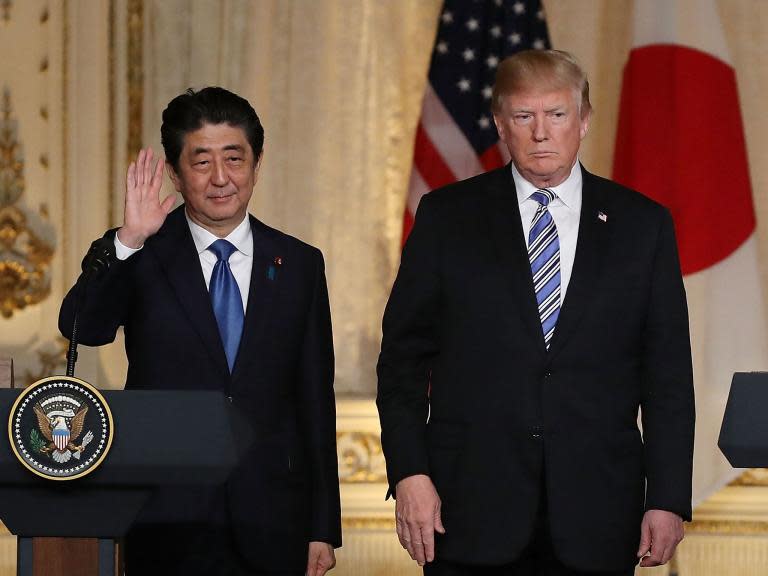Donald Trump and Shinzo Abe fail to agree on US tariff exemption for Japan
Donald Trump and Shinzo Abe have failed to reach a deal which would exempt Japan from the US’s steel and aluminium tariffs.
The US president and Japanese prime minister said they had agreed to start talks on a new “free, fair and reciprocal” trade agreement following two days of talks.
“If we can come to an arrangement on a new deal, that would certainly be something we would discuss,” Mr Trump said when asked about the tariffs during a joint press conference at his private Mar-a-Lago club, where the pair also spent their time golfing and dining.
But he said the current trade deficit between the two countries was too high to merit an exemption right now. That deficit was $56.1bn (£40bn) last year, according to the US Department of Commerce.
Japan remains the only major US ally which is not exempted from the 25 per cent tariff on steel imports and a 10 per cent tariff on aluminium imports.
Most other key allies, among them the European Union, Canada, Australia and Mexico, have already been granted exemptions to Mr Trump’s protectionist measures.
Mr Abe argued Japanese imports “would not exert any negative influence” on the security of the US,. He added that the high quality of Japanese steel and aluminium products would be difficult to replace.
Mr Trump said the tariffs had brought many countries to the negotiating table. He added that he may take them off steel and aluminium imported from Japan, if the two countries can come to a trade agreement.
However, he made it clear he would prefer a bilateral trade deal with Japan instead of rejoining the 11-nation Trans-Pacific Partnership (TPP) trade deal.
Agreed by his predecessor Barack Obama, the pact aimed to deepen economic ties between the 12 countries that border the Pacific Ocean, cutting tariffs and fostering trade to boost growth.
The agreement was designed so that it could eventually create a new single market, something like that of the European Union. But all 12 nations needed to ratify it, before it could come into effect.
Mr Trump, repeatedly criticised the pact and pledged to abandon it during his presidential campaign, a promise he kept once he assumed power.
Speaking after his meeting with Mr Abe, he said: “I don’t want to go back into TPP, but if they offered us a deal that I can’t refuse on behalf of the United States, I would do it."
But he added: ”I like bilateral better. I think it’s better for our country, I think it’s better for our workers, and I much would prefer a bilateral deal, a deal directly with Japan.”
Mr Abe also highlighted the differences between each country’s approach.
“On the US side, they are interested in a bilateral deal,” he told reporters. “Our country’s position is that TPP is the best for both of our countries."

 Yahoo News
Yahoo News 

